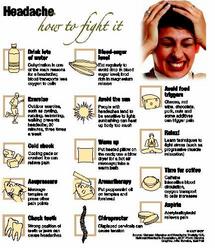Men who suffer with headaches
Published: Wednesday | January 14, 2009

One of the top 10 reasons for visiting a general practitioner is severe headaches. Most of us have headaches occasionally, but some people have severe headaches almost daily. The most common headaches are caused by tension, sinusitis and migraines. Although men are three times less likely than women to suffer from headaches, they are more likely to bear the brunt of the serious ones like cluster headaches.
Tension headaches
Tension headaches occur frequently at the end of the day. Men complain of a headache which feels like a tight band around the head and a tension in the back of the head and neck. Sometimes, the sufferers start the day with a headache,especially if the night was spent sleeping fitfully and worrying. Tension headaches are relieved by sleeping, relaxation and over-the-counter medications such as acetaminophen.
Sinus headaches
Men who suffer from heaviness or a sense of pressure in their heads, often involving pain behind the eyes may be suffering from sinus headaches. These persons usually report a post-nasal drip or nasal stuffiness. These headaches worsen with movement of the head and are associated with light-headedness or dizziness. The sinus headache resolves when the sinusitis is treated.
Migraines
Migraines are less common in men, but are just as incapacitating. They tend to occur on one side of the head and may involve the eye on the same side. They can be triggered by certain foods, such as chocolates, cheese and alcohol. These headaches may be preceded by certain feelings or sensations, such as blurred vision or flashing lights. They can last a few hours or several days. Over-the-counter pain medication and caffeine will resolve most attacks. Men who suffer from migraines should visit their health provider for evaluation and long-term management.
Cluster headaches
Although men suffer less frequently than women from headaches, there is a severe type called cluster headaches which is more often experienced by men. Fortunately, cluster headaches are not common, but tend to reoccur over time. They tend to occur one to three times per day for two to 12 weeks. Each headache may last 15 minutes to one and a half hours. They are said to be 100 times more intense than migraines. Treatment involves breathing oxygen and prescription drugs such as sumatriptan.
Dangerous Headaches
The sudden occurrence of headaches in someone without previous attacks, which seem to intensify daily, are not relieved with over-the-counter pain relievers, or are associated with fever, visual problems or weakness should prompt an urgent visit to a physician. These may be symptoms of subarrachnoid brain haemorrhages, meningitis (infection of the lining of the brain) or a brain tumour.
Chronic headaches
People who have headaches more than 15 days per month are said to be chronic headache sufferers. A significantly higher proportion of obese persons suffer from headaches. People who snore also tend to suffer from frequent headaches. People who suffer from painful conditions such as arthritis tend to get headaches more often. Stressful life events such as moving, death of a family member, and changes in marital status are associated with severe headaches.
Dr Pauline Williams-Green is a family physician and president of the Caribbean College of Family Physicians; email: yourhealth@gleanerjm.com.



